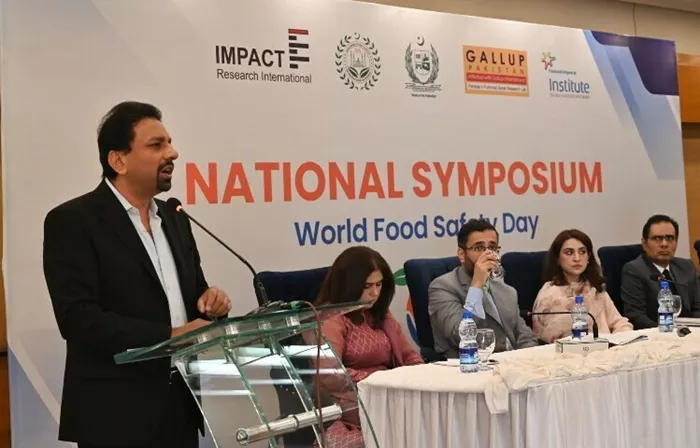A panel discussion titled “Science in Action and Fiscal Governance for Safe Food” was held in Islamabad, jointly organised by the Senate, Gallup Pakistan, Impact Research International, and the Islamabad Food Authority, according to a press release issued after the event.
The discussion focused on the urgent need for a science-based approach to food safety in Pakistan and highlighted the importance of fiscal reforms, particularly in taxation policy, to support the formal food sector. Speakers emphasised that food safety is not only a present concern but a future challenge requiring comprehensive reforms and strong policy implementation.
Senator Syed Masroor Ahsan, Chairman of the Senate Standing Committee on National Food Security and Research, presided over the session. He called for the development of evidence-based policies to ensure access to safe and traceable food that meets international standards. He stated that the country’s food systems must evolve to build public trust and ensure compliance and transparency across the supply chain.
Advisor to the Senate on Special Initiatives, Rida Qazi, reinforced the message, saying that food safety should begin at the farm and continue all the way to the consumer’s plate. She stressed that only food that is safe deserves to be called food.
Jamil Ahmed Qureshi, Secretary of the Special Investment Facilitation Council (SIFC), stressed the need for fiscal policies that align with public health goals. He argued against taxing safe packaged milk, calling such measures counterproductive. Instead, he urged the government to promote the formalisation of the food sector and prioritise public welfare through supportive policies.
A food industry expert pointed out that the current taxation system does not support food safety efforts. He warned that taxing formal sector products risks pushing consumers toward unsafe, unregulated alternatives, which undermines overall food security.
Bilal Gillani, CEO of Gallup Pakistan, highlighted the importance of integrating science, economics, and culture to achieve true food security. He said scientists must lead with data, economists should design inclusive budgets, and cultural norms must shift to encourage the regular consumption of safe and nutritious food.
Panellist Hana Mehmood stressed that decisions about public health and food policy should be based on scientific evidence. She said that protecting public health and empowering consumers starts with providing safe food and clear nutritional information.
The panel agreed that the formal food sector offers better traceability, nutritional labelling, and regular monitoring for microbial and chemical safety. Zubair Faisal Abbasi from Impact Research International added that these products follow Codex Alimentarius standards and are overseen by national and provincial food safety authorities. He called for fiscal policies that actively encourage participation in the formal food economy.
The discussion concluded with a strong message from the participants: “It’s not food if it’s not safe.” The press release noted that current taxation policies make safer food options less accessible, and experts warned this could harm both public health and long-term food security. They called for fairer tax structures aligned with global standards to improve access to safe nutrition and strengthen the country’s health and resilience.
Related Topics:
BowFlex Adjustable Dumbbells Recalled Over Injury Risks


